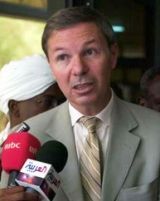Trust cannot be bought by weakness in Sudan – UN official
July 17, 2007 (BRUSSELS) — United Nations and African Union forces need a robust mandate in Darfur and the Security Council should not dilute it to win support for the mission from Sudan, a top U.N. peacekeeping official said on Tuesday.
 “Trust should not be bought by weakness,” Jean-Marie Guehenno, U.N. undersecretary-general in charge of peacekeeping, told Reuters in an interview.
“Trust should not be bought by weakness,” Jean-Marie Guehenno, U.N. undersecretary-general in charge of peacekeeping, told Reuters in an interview.
“No mission can work if it does not have the trust of all partners … so we must establish this trust. But at the same time a peacekeeping mission in difficult conditions such as in Darfur must have the means to act,” he said.
Under sustained international pressure, Sudan agreed last month to a combined U.N.-AU peacekeeping force for Darfur to quell four years of violence that has driven more than 2 million people from their homes. An estimated 200,000 people have died.
U.N. Secretary-General Ban Ki-moon told the 15-member U.N. Security Council on Monday to move quickly in authorizing up to 26,000 troops and police for the Darfur mission.
But a dispute has arisen among council members over a resolution sponsored by Britain, France and Ghana, without which member states will not commit personnel.
Sudan and several council members believe the resolution contains too many references to humanitarian and other issues, including a threat “to use all necessary means” in the areas of deployment.
Guehenno said the mission needed just such a “robust” mandate.
“It must be allowed to use all necessary means to accomplish its mission,” he said.
“Trust must be based on a clear contract, with the mission being there to help the Sudanese to make peace with themselves. But to do that, it will need robust means, so we need a robust mandate that allows troops to act with the necessary firmness.”
Overstretched and badly equipped AU troops have been unable to stop the violence that flared after mostly non-Arab rebels took up arms in 2003 accusing Sudan’s central government of neglecting the remote, arid western region.
Khartoum mobilized militias, called Janjaweed, to quell the revolt. Khartoum denies supporting the Janjaweed and puts the death toll at 9,000.
(Reuters)
